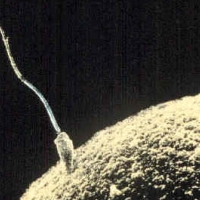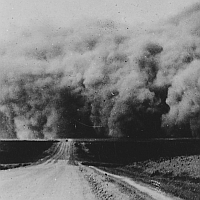- About Us
- Columns
- Letters
- Cartoons
- The Udder Limits
- Archives
- Ezy Reading Archive
- 2024 Cud Archives
- 2023 Cud Archives
- 2022 Cud Archives
- 2021 Cud Archives
- 2020 Cud Archives
- 2015-2019
- 2010-2014
- 2004-2009
 |
This month’s theme: |
This month’s theme:
Wikiflash
Sometimes I just get writer’s block. Most of us do. When I’m on deadline for this column and having trouble coming up with ideas for several themed stories, I have to come up with creative ways to get my brain working. Once I was absolutely stuck and decreed that whatever I saw in the next commercial on TV would be my theme; the next thing I saw were were trees, and suddenly I had a slew of ideas for tree stories (see http://thecud.com/live/content/cud-flashes-pan-31) . This month was a writer’s-block situation, so in desperation I visited Wikipedia, started clicking “Random” to see random articles, and whenever a title came up that stoked an idea, I wrote something based on it, with the name of the article being the name of the short story (minus any parentheticals in the title).
“Mother of Thousands”
Dystopian (Utopian?)
By David M. Fitzpatrick
Vanessa stood in the massive underground facility. It stood thirty feet high and stretched hundreds of feet deep and wide, its concrete roof supported by countless steel columns. The incubators lit up the darkness, a sprawling array of rows and columns of soft yellow glows.
“They’re all waiting, lady,” the skinny, repulsive little man with crooked glasses and a lab coat said to her. He smelled of male body odor, and his hair was oily. He disgusted her, but she needed him—for now. Not for much longer.
“Twenty thousand?” she asked. She held her clutch purse tightly in her left hand.
Behind them, by the entrance door, her entourage of several dozen loyal women waited in silence.
He nodded. “Viable eggs from twenty thousand donors. An excellent array of genes from some of the best women we could find. All of them smart, healthy, and beautiful. Fantastic physical specimens.” He grinned at this, and from the corner of her eye she saw him adjust himself in his pants. He was such a pig. Like all of them.
“Then I’m ready,” she said. “How long to inseminate them all?”
“Once I fire up the electrodes, as fast as those implants can produce sperm.”
She pulled up her blouse for him to attach the electrodes, keeping her clutch purse tightly in her hand. He’d grown testicles from her own stem cells and implanted them into her abdomen. She didn’t care for the idea of oozing semen out of her navel, but considering the trade-off, it would be worth it.
“We’ll do it in stages,” he explained. “I’ll collect the semen as it’s expelled, and we should be able to fertilize several hundred per day. You just need proper rest and nutrition throughout the process, so your sperm are healthy and first-rate.”
“And you’re positive this will work the way I want?”
He scoffed. “Lady, you hired the best geneticist on the planet,” he said. “Every one of those children will be female. Every one of them will produce sperm. Testosterone will be at female-normal levels. Your dream of a male-free world will be a reality.”
He was arrogant, but he was right. She knew it. She’d have preferred to have the best geneticist in the world be female, but she’d had to settle for a man. Besides, the three female geneticists she’d approached were appalled by her plan and had refused to participate. It took a man to agree to something that other women felt was unethical and abhorrent.
“The world needs to be free of men,” Vanessa said. “Your gender is why there have been wars and destruction throughout human history. It’s time for women to rule. And we’ll do it peacefully—just let the men die off. Soon there will be just us.”
“Whatever, lady,” he said, rolling his eyes. “I won’t be here to see it. You just make sure the money keeps coming for the rest of my life, and I’ll keep your secret.”
She laughed and she opened her clutch purse and reached in. “Like I’d ever trust you with my secrets. You’re a man, doctor—you can’t be trusted.”
She drew the gun from her purse and shot him right between the eyes, and he fell to the floor.
Her entourage of women advanced as the doctor bled on the floor. The smiling crowd eagerly awaited her orders.
“Time to change the world, ladies,” Vanessa said. “No more of the senseless violence, the mindless destruction, and the arrogance of one gender. Let’s do this.”
“Fort Bend County Toll Road Authority”
Post-Apocalypse
By David M. Fitzpatrick
“No one passes without paying!” the wild-eyed man cried, hand out before him in the darkness.
The asphalt of what was once Texas State Highway 99 was cracked and split, with weeds growing up everywhere. Faint painted lines were still visible. The tollbooths spanning the dead highway were dilapidated and falling apart. John Stiles, on his old bicycle, big pack on his back, regarded the man blocking his path.
“The toolbooths don’t collect tolls anymore,” John said. “Not since the Big War twenty years ago.”
“Liar!” the man screamed. “You’ll pay the toll, sir, or you’ll go no further! I work for the Fort Bend County Toll Road Authority, and it’s my job to collect the tolls!”
In the moonlight, John could see that the old man’s weatherbeaten face was scarred and his scraggly beard was long. He wore rags, but his jacket, old and coming apart, still bore the insignia of the FBCTRA. The devastation after the war must have taken the old man’s sanity. He was still here, decades later, trying to do his job. It was one of the most heartbreaking thing John had seen since everything had changed, and he’d seen lots of heartbreaking things in twenty-seven years.
John knew that the man wouldn’t be able to catch him on the bike. Heck, he could ride around the crazy old codger and keep going up the highway. Sometimes, though, John knew you just had to pity someone like this.
“Sir, there’s no more money,” John said. “Money doesn’t matter anymore.”
“Then you’ll pass over my dead body,” the man snarled. He reached to his belt and pulled out a huge knife that was rusty and pitted and old.
John sighed. “Look, sir, I don’t have money. Maybe I could give you some food. Would that be a sufficient toll?”
The man seemed to consider it. He did look malnourished. John dug into his jacket pocket and came up with some jerky he’d made. He held out a big slab of the stuff.
“Porcupine jerky,” John said. “It tastes like shit, but it will feed you.”
The old man hesitated, lowered his knife. “I suppose the Fort Bend County Toll Road Authority would accept that as a toll,” he said, reaching out. He took the jerky and backed off a step. He sniffed it.
John pulled out another piece and bit into it to show the poor guy that it was safe. The toll collector followed suit.
“You’ve worked here a long time,” John said.
The man nodded. “I was a good worker for years before the war. Still am. Someone has to keep working the tools. The world will get better someday. Have to keep doing civilized stuff, you know.”
There came a sudden flash of lights in the darkness, from behind John. He turned to see a big truck approaching. Vehicles were rare these days, and those driving them were key key targets of others who wanted those vehicles.
“Cars usually don’t stop,” the toll collector said. “If he doesn’t have an EZ TAG, he needs to pay…”
The truck bore down on them, angling left to go around them. The old man broke into a run, out in front of the speeding truck, holding up his hands.
“STOP!” the man screamed. “YOU NEED TO PAY THE TOLL!”
The driver could have gone around the old man, but instead he accelerated and steered right at him. The old man when under its its wheels before John could even holler for him to get out of the way. The truck kept going, through the toll booth, and then off into the night. John leaped off his bike and ran to the old man. His body was crushed and broken, and there was blood everywhere. The truck had gone right over his head. The old man was very dead.
John steeled himself. The man was free of his insanity, but he’d survived so long with it that it was wrong that he’d been killed. The truck’s driver hadn’t had the right to take his life like that. The world was so callous, so uncaring, so selfish.
The toll collector still held the slab of jerky in his dead hand. John retrieved it and returned to his bicycle.
“List of Caves in Western Australia”
Contemporary Fantasy
By David M. Fitzpatrick
Milena hated this assignment. She didn’t know why she’d accepted it. Her publisher wanted to do a guidebook about caves in Western Australia, and she, having done a bit of amateur spelunking before, had agreed. It was steady work for a year. She wasn’t getting any cash out of her estranged husband who she’d found was cheating on her with just about everybody, so she needed the money.
But if she’d known how damned boring it would be, she’d never have agreed to it. Life was already boring and tedious enough. She needed excitement. She needed something different. She needed something to make her feel alive. Since her parents had died in a plane crash in Canada last year, she’d felt dead inside. That, and discovering Derek’s infidelities, and utterly transformed her life. She was miserable in every way.
And now, as if things couldn’t be worse, Milena was lost in a cave, and it wasn’t even noontime yet.
It was supposed to be just one tunnel and a single cavern, but after a dozen wandering turns she couldn’t find her way out. Her phone had no signal; she only had her audio recorder and a flashlight. She cursed herself for taking on this assignment. Her publisher had always sucked—shorting her on royalty payments, giving her crap assignments presented as choice, doing weak rewrites on her stuff—but this gig had been spelled out clearly.
She’d been excited about it, but after the first dozen caves, it had become old hat. Now, just three months in, she’d had enough. She could only shoot so many pictures of caves, and only write about caves in so many ways.
Milena wasn’t ready to panic, but she was worried. She kept rounding dark, damp corners into new caves that she hadn’t seen before, and the lack of anything familiar was getting her heart racing. It was bad enough that her high-school reunion was coming up, and she’d have to get together with the successful doctors, lawyers, and businesspeople who were the same arrogant bastards they’d been back in school. How was she to talk up her writing career? She wasn’t the bestselling novelist she’d wanted to be. She was writing about caves. Great.
A glimmer of hope flashed through her brain. Maybe she’d get seriously lost, almost die, and write a book about it. Then she realized that even she wouldn’t buy that title. No, getting lost here was just more bad luck in a life barely worth living.
Up ahead, she saw a flash of light. Hope surged within her. Daylight? She’d get out of here and quit the stupid gig. The publisher could keep the money. She was done.
She headed up the tunnel and the light flashed again. The tunnel bent sharply to the left, and the light flashed again from beyond. She broke into a run and rounded the bend…
…and for a moment she was blinded as the light flashed again. She came to a stop as darkness fell over her. She blinked and focused.
She was at the mouth of a cave—not THE cave she’d entered, but A cave, a different one. The cave’s mouth was on a hillside, and it was night. It had been late morning a half-hour before. She stood in stunned silence.
In the valley below, a city of domed structures dotted the landscape, around where three rivers converged into one big river. Above, in the starlit night sky, there was a big, golden moon and two smaller, silvery moons. Across the sky was a cloudlike band of green and blue and yellow, like a nebula near the world.
And suddenly, over her head, a giant bird flew, and she could see two people riding it. As her eyes adjusted to the darkness, she could see that there were such giant birds flying all over the valley, ferrying riders to and from the dome-laden city.
It didn’t take much mental processing for her to realize that she was no longer on Earth.
She looked back into the cave, and saw the bend that she’d rounded. Every few seconds, the mysterious light would flash, but she realized that it was flashing faster and faster, with less time between the flashes. It was as if the cave were telling her that she was running out of time to get back home.
All her sorrows melted away in that moment. This was the ultimate way to wipe her life’s slate clean. There was no way she was going back.
As the flashing became a frantic strobelight, she headed down the hillside.
“The Guitar Man”
Post-Apocalypse
By David M. Fitzpatrick
The sounds cut through the dusty haze, and they were like nothing the boy had ever experienced. He’d heard people singing, and some of the really old people had told of instruments that made beautiful sounds called music, but he’d never imagined what those sounds would be.
The metallic tones were like an aural paradise. The boy, kerchief around his mouth to keep the dust from his lungs, made his way through the haze, following the sound, until he saw the man. He was seated on a barrel; the barrel had straps, used as a traveling pack as well as a seat. The man wore dirty clothing and a wide-brimmed had pulled low. He also wore a kerchief around his mouth.
And the man held a big thing with a long arm on it, and the thing had metal cords. The man was making the cords sing with his fingers, while his other hand danced along the cords on the thing’s arm. The boy stopped before the seated man and listened in awe as the man played the beautiful sounds. It was something more beautiful than those rare days when the dust settled and the boy could see blue sky and the golden sun. Such instances were so rare, and lasted so briefly, but reminded the boy that there was some hope for the future of the world beyond mere survival.
The boy listened in silent reverence as the man began to sing in tune with the music he was making. He sung of hope and love and perseverance, and the boy didn’t really understand the words, but he knew they were meaningful—and the music he made with his instrument gave them a structure of beautiful power.
Eventually, the man stopped and looked up at the boy. He reached up, tilted his hat back on his head, and pulled his kerchief down. He was grizzled and old—ancient, perhaps, probably a man who had lived in the time before the world had died.
“That instrument is incredible,” the boy said.
“No, it’s a guitar,” the old man corrected him. “It’s not incredible, son. What a person does with it is incredible. You play it and you sing the songs, and you’ll make a difference in the lives of all who hear you.”
The boy nodded in stunned silence.
“I’m dying, son,” the old man said. “Been coming a while now. Today I feel it in my arm. My heart’s going. It ought to—it’s been beating in this old chest for a hundred years, and ninety of those years have been since the world died.”
“But if you die… the guitar won’t play anymore,” the boy said. He knew he sounded terrible—worried over the music in the face of a man’s death. But losing such a beautiful thing would be so tragic—worse than the death of a man.
“Did this music change your life?” the old man asked, wheezing. He seemed unsteady on his barrel.
The boy nodded. “My parents are dead. I’ve been surviving alone for two years. Until I heard your music, I’d never found anything good in the world.”
“Then take this guitar when I’m gone,” the man said. “I’ve waited for someone. Maybe holding on to life while I waited. There are books in my pack to tell you how to tune this thing, how to fix it when it breaks, and how to play the basics. You learn those basics, and you’ll teach yourself more, every day as you play.”
“But I can’t do what you do!” the boy cried.
“You can. I didn’t play before the world died. An old man showed me how, long before you were born.” His face screwed up in pain for a moment. “You carry it on. Play for anyone who will listen. Play for those who won’t. Play for yourself. Play for the future, boy. Play for the day when people will once again have guitars and other instruments and make music for everyone.”
He got his hands into position again and began to play and sing. This was a lilting, happy song, and he played it loud and he sang loud, and he swung the guitar about as he sang and played, enjoying every moment of the final performance of his life, as if he were playing for thousands of people and not just a lone young boy. He kept playing like that for a long time. The boy stood, listening and watching, absorbing it all in awe.
He didn’t want it to end, but soon it did. The old man finished a rollicking song and gave one final strum of the strings, and he smiled at the boy before his eyes closed and he slid off his barrel and to the dusty ground.
* * *
That night, the boy was back in the old shack he called home, sitting on the old man’s barrel, the guitar on his lap. He had the book in front of him, ready to learn how to play.
But first he just held it, and he dragged his fingers across the strings, and he heard and felt the strummed sound reverberate throughout the dusty night.
And he smiled.
“Superwoman”
Superhero (Blue Blaze first appeared in last month’s Cud Flashes which you can read HERE)
By David M. Fitzpatrick
It was a battle of epic proportions, right in the center of Midway City.
The giant killer robot was three stories tall, and it was stomping cars and smashing buildings as it went. Crimson blasts from its glowing red eyes blew up approaching police vehicles before they could even get close enough to engage the machine. People ran screaming in every direction. Just when it seemed like the robot would go on to do some serious damage to the downtown area, Blue Blaze arrived.
The city’s masked heroine, in her costume of royal blue, dark-blue cape fluttering, flew in from behind the robot. She glowed with an overall blue luminescence, and had “BB” across her ample breasts. And she didn’t waste any time, flying like a bullet right into the robot’s massive torso. The robot pitched forward and went down in a metallic heap. It struggled to get back up, but Blue Blaze was on him. She landed next to it and punched right through its body. Electricity sparked and the robot grabbed for her.
It got her in its massive three-fingered grip, but the statuesque woman with the cascading blue hair used her super-strength to force the big fingers apart—and tore one of the fingers completely off to free herself. The robot had zeroed in on her, though, and began firing crimson blasts at her. With super speed, Blue Blaze flew up and down, left and right, back and forth, evading the blasts, which took out cars, buildings, a mailbox, a tree.
“Two can play at that game,” Blue Blaze said, and her eyes glowed bright blue.
The robot clambered to its feet and fired another blast at Blue Blaze, but she sidestepped it and let loose with her own blasts. Blue bolts erupted from her eyes like machinegun fire and riddled the walking tanks metal body full of holes. She kept it up as the robot staggered back, trying to escape the assault, but finally it tripped over a car and fell backward with a crash.
With no time to waste, Blue Blaze rocketed forward, wrapped her super-powered arms around the robot’s head, dug her fingers right into that head, and tore it clean off. The robot’s glowing red eye went dark, and its flailing arms and legs crashed down. It was dead.
People on the street and in the buildings cheered.
* * *
Jillian James collapsed, exhausted, onto her couch. She still wore her blue costume, but her cape and mask were off. With her power now dormant, she no longer glowed blue, and her hair was its usual brown. She clicked on the TV in time to see footage of her battle with the robot. Talking heads were arguing about it.
“So Blue Blaze comes into Midway City today and does more damage than the robot was doing, and why aren’t we calling her out on that?” one angry man hollered.
“Are you kidding me?” Jillian said to the TV.
“Excellent point, Bill,” another man said. “Look, the robot was doing damage, no one disputes that. But it looks like the police would have had things under control and with less damage.”
“You’re kidding me, Jack!” a woman talking head said. “The police couldn’t get near that thing. Blue Blaze probably saved lives today.”
“PROBABLY,” Jack said. “All we know FOR SURE is that she’s responsible for a lot of mayhem and a lot of damage.”
“I can’t believe this,” Jillian said.
“You’re being unreasonable,” the woman on TV said, “and it’s because you’re sexist. When Ultrawarrior saved Midway City from the alien incursion last year, he was responsible for a lot more damage than this, but everyone rightly revered him because he saved a lot of lives. So why does the female hero get such different treatment?”
“Come on, Maryann—Blue Blaze is no Ultrwarrior,” Jack snapped.
“Agreed,” Bill said. “Ultrawarrior has repeatedly proven his value to Midway City and his ability to make smart decisions when battling supervillains in the streets. Blue Blaze should have consulted with law enforcement before acting.”
“So Blue Blaze, the woman, needs permission from the men?” Maryann argued. “And she isn’t smart like Ultrawarrior, the man? Please!”
Jillian grabbed the remote and angrily snapped off the TV.
“Don’t take it so hard,” came a voice from her left. She looked to see Ultrawarrior levitating in her balcony window, in his red suit and blue cape and big U on his chest. He was a huge, muscular black man.
She sighed. “Thanks, Cole. It’s just frustrating. You can do no wrong, but no matter what I do, they crap on me. And it really is because I’m a woman.”
“Of course it is,” he said. “But look at me. The first year I was in action, I got a lot of crap—but it was because I was black, even though most people would never admit it. There are plenty of racists today who still don’t like anything I do, no matter how many people I save.”
He glided into her apartment and landed next to her on the couch. “You did it all right today,” he said. “We both know it, and most people know it.”
She sighed again and put her feet up on her coffee table. “Just what does anyone who isn’t a white male have to do to get treated as an equal in this world?”
He smiled. “There will always be people like that who are hateful and intolerant. Don’t worry about their approval. There are plenty of people who appreciate what we do. And more come every day.”
“Maybe not soon enough.”
David M. Fitzpatrick is a fiction writer in Maine, USA. His many short stories have appeared in print magazines and anthologies around the world. He writes for a newspaper, writes fiction, edits anthologies, and teaches creative writing. Visit him at www.fitz42.net/writer to learn more.
